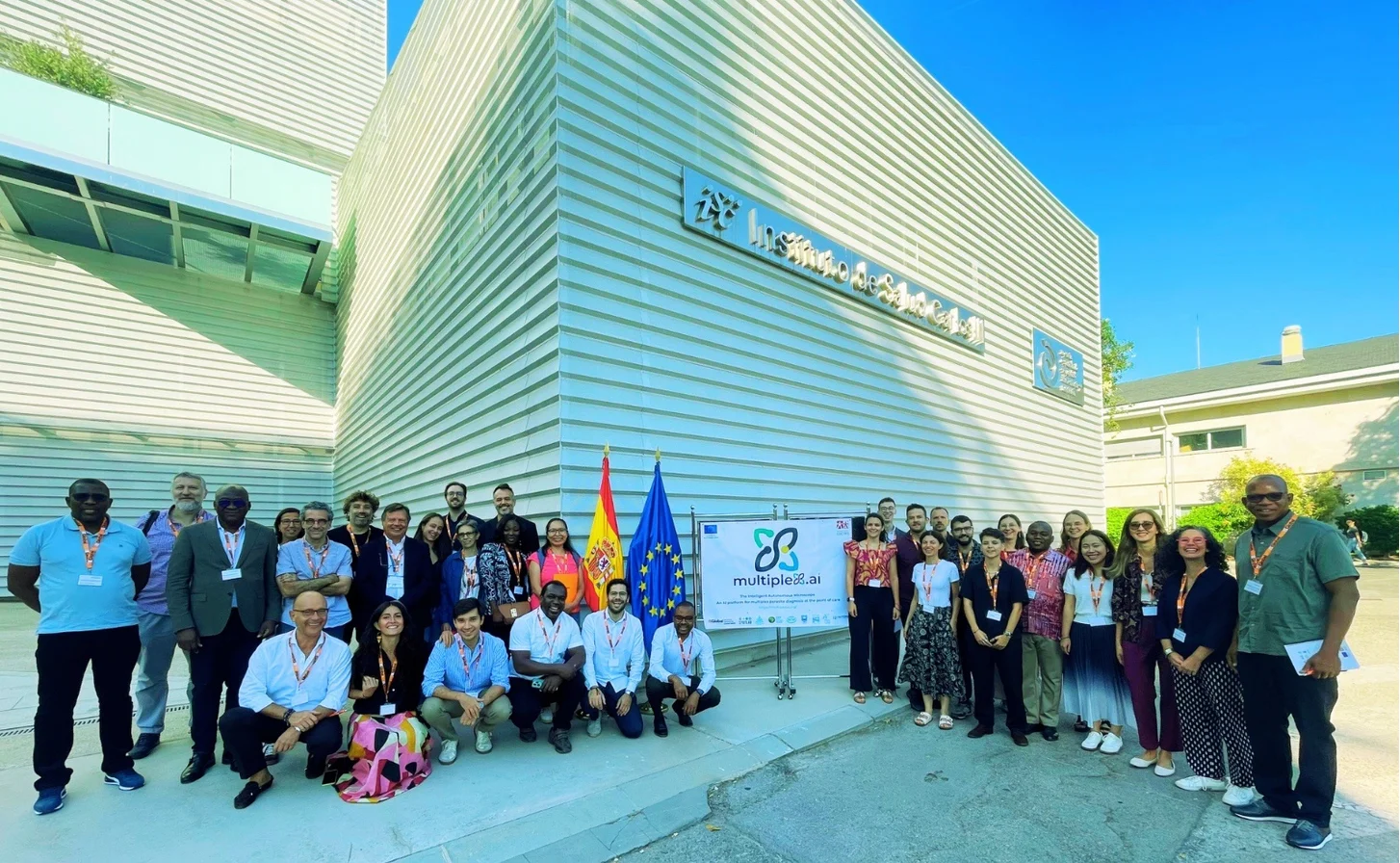MultiplexAI: Revolutionizing Parasitic Disease Diagnosis with AI at the Point of Care
A groundbreaking initiative is poised to transform the landscape of global health diagnostics. A consortium of nine institutions, spanning Africa and Europe with significant Spanish involvement, has launched MultiplexAI. This ambitious project aims to develop a sophisticated mobile diagnostic tool powered by artificial intelligence (AI) capable of enhancing the detection of a wide spectrum of parasitic diseases. The ultimate goal is to bring rapid, accurate, and accessible diagnostic capabilities directly to where they are needed most, particularly in underserved regions.

The MultiplexAI initiative is a three-and-a-half-year endeavor, bolstered by a substantial funding of over 5 million euros from the European & Developing Countries Clinical Trials Partnership (EDCTP3). This robust financial backing underscores the perceived importance and potential impact of the project. At its core, MultiplexAI seeks to validate and implement a scalable AI-driven diagnostic platform specifically designed for parasitic ailments. By strengthening local diagnostic capacities, minimizing misdiagnoses, and championing universal health coverage, the project tackles a critical global health challenge. Parasitic infections, such as malaria, Chagas disease, leishmaniasis, and toxoplasmosis, continue to impose a significant burden on public health worldwide, disproportionately affecting vulnerable populations.
The Spanish National Centre for Microbiology (CNM-ISCIII), a key partner in this undertaking, will play a pivotal role. Researchers at the CNM-ISCIII will be instrumental in developing the AI tool by providing and processing biological samples to train the AI algorithms. They will also spearhead the creation of protocols for the digitalization and cataloging of these samples, ensuring the highest standards of quality control throughout the multinational clinical validation phases. Dr. José Miguel Rubio, Director of CNM-ISCIII and a lead investigator on the project, highlighted the significance of this collaboration: “MultiplexAI represents a unique opportunity to advance diagnostic capabilities using cutting-edge AI, while simultaneously generating high-quality data from diverse epidemiological settings.”
Transforming Microscopy with AI-Powered Insights
The envisioned application from MultiplexAI aims to elevate traditional optical microscopy into a smarter, more autonomous diagnostic instrument. This innovation promises to deliver diagnoses directly at the point of care (POC), unlocking unprecedented possibilities for healthcare that is faster, more precise, and significantly more accessible, especially in remote or resource-limited environments. This aligns with a broader trend in AI in Healthcare: The Indispensable Medical Ally of the Future, where AI is increasingly being deployed to augment human expertise and improve patient outcomes.
This pioneering initiative benefits from the support of the European Union’s EDCTP3 program, fostering collaboration among partners located in Nigeria, Mozambique, Côte d’Ivoire, Ethiopia, Italy, and Spain. The project’s coordination is spearheaded by the Barcelona Institute for Global Health (ISGlobal), a world-renowned research institution. The technological backbone of MultiplexAI is provided by SpotLab, a Spanish company with deep expertise in applying artificial intelligence to medical diagnostics and biopharmaceutical research. This blend of academic rigor, governmental support, and specialized technological prowess positions MultiplexAI for significant success.
Addressing the Diagnostic Gap in Parasitic Diseases
Parasitic diseases, including malaria and a host of neglected tropical diseases (NTDs), remain primary drivers of morbidity and mortality in low- and middle-income countries. The current diagnostic paradigm largely relies on manual microscopy, a method that is inherently time-consuming and heavily dependent on the availability of skilled personnel. This reliance often leads to delays in diagnosis, variability in results, and an increased risk of incorrect or imprecise diagnoses. Such limitations can have dire consequences for patient treatment and disease control efforts.
MultiplexAI is meticulously designed to clinically validate a system that offers rapid, accurate, and affordable parasite diagnosis at the point of care. The system works by analyzing microscopic images of biological samples, such as blood smears, to identify distinct patterns indicative of parasitic infections. At its heart is an advanced AI model, leveraging the power of computer vision. This model is engineered to operate on smartphones, which can be readily connected to standard microscopes. This setup enables the AI to process images and deliver diagnostic results in near real-time, drastically reducing turnaround times compared to conventional methods. This innovation echoes the transformative potential of AI in other fields, such as AI Revolution: Decoding the Future of Intelligence and Innovation, where it’s redefining capabilities.
Miguel Luengo-Oroz, CEO of SpotLab, eloquently articulated the project’s vision: “Our aim is to revolutionize the use of AI, transforming millions of microscopes worldwide into a network of intelligent devices capable of delivering reliable diagnoses and medical insights to everyone, everywhere. This is a significant AI technical challenge, aimed at solving a profoundly relevant problem.” The potential for this technology to democratize advanced diagnostics is immense, breaking down geographical and economic barriers that have historically hindered access to essential healthcare.
Enhancing Healthcare Accessibility and Equity
The MultiplexAI project builds upon existing European AI innovations, which are already making waves in hospitals and research centers globally. However, this initiative pushes the boundaries further by developing an AI model capable of detecting multiple parasites from a single sample. This multi-analyte capability empowers healthcare professionals with comprehensive information, aiding in more informed clinical decision-making. The system is designed for offline functionality, a crucial feature for environments with unreliable internet connectivity. When connectivity is available, it can seamlessly integrate with telemedicine platforms, extending its reach and utility.
The system’s adaptability is further underscored by its planned validation through clinical studies across various African and European countries. This diverse validation process will ensure the AI’s robustness and efficacy in a wide range of real-world clinical settings and epidemiological contexts. This rigorous testing is essential for building trust and ensuring the tool’s widespread adoption.
Gloria Dada Chechet, Associate Professor at ABU in Nigeria and the Scientific Director of the MultiplexAI project, emphasized the urgent need for such innovations: “Too often, the places that most desperately need reliable diagnostics are the least equipped to access them. We are striving to address this challenge by bringing expert-level analysis directly to the point of care.” Her statement highlights the critical equity dimension of the project, aiming to bridge the gap in healthcare access between developed and developing nations.
Beyond the technical advancements, MultiplexAI is committed to improving patient outcomes by reducing misdiagnoses and strengthening healthcare systems. A core principle guiding the project is the development and deployment of responsible and equitable AI, adhering to the ethical guidelines established by the World Health Organization (WHO). This commitment ensures that the AI is not only effective but also trustworthy, safe, and sustainable in its application. To facilitate this, the initiative will develop a Global Access Plan, meticulously outlining a responsible deployment strategy to guarantee equitable access, with a particular focus on underserved and neglected regions. This proactive approach to access and equity is vital for maximizing the societal benefits of AI in healthcare. The project’s emphasis on responsible AI development and deployment is paramount, especially considering the rapid advancements and potential ethical considerations surrounding AI technologies, as explored in discussions about Grok AI Ethics: Navigating the Complexities of Content Generation and Safety and the evolving landscape of AI regulation.
The Future of Diagnostics: Empowering Local Healthcare Providers
The implications of MultiplexAI extend far beyond simply improving diagnostic accuracy. By democratizing access to advanced diagnostic tools, the project aims to empower local healthcare providers, particularly in remote areas where specialists are scarce. This empowerment can lead to earlier interventions, more effective treatment plans, and ultimately, a reduction in the burden of parasitic diseases. The ability to perform multiple tests from a single sample also streamlines the diagnostic process, saving valuable time and resources.
The development of an AI that can function offline is a critical component for its success in regions with limited or unreliable internet infrastructure. This feature ensures that the diagnostic tool remains operational even in challenging environments, making it a truly robust solution for global health challenges. The integration with telemedicine platforms when connectivity is available further enhances its versatility, allowing for remote consultations and data sharing when feasible.
The rigorous clinical validation process planned across diverse settings will be crucial for building confidence in the AI’s performance and reliability. This multi-national approach will help identify any potential biases or limitations, ensuring that the tool is effective for a broad range of populations and geographical locations. Such comprehensive validation is a hallmark of responsible AI development, aligning with efforts to ensure AI’s positive impact across various sectors, from AI in Healthcare Supply Chains: Predictive Tools for Unprecedented Resilience to product development.
Ensuring Equitable Access and Responsible Deployment
A fundamental tenet of the MultiplexAI project is its commitment to responsible and equitable deployment. The development of a Global Access Plan is a testament to this commitment, ensuring that the benefits of this advanced AI diagnostic tool reach those who need it most, without exacerbating existing inequalities. This focus on equitable access is crucial for realizing the full potential of AI in addressing global health disparities. The project’s adherence to WHO ethical principles further underscores its dedication to developing AI that is both effective and ethically sound.
The success of MultiplexAI could serve as a model for future AI-driven health initiatives, demonstrating how international collaboration, technological innovation, and a strong commitment to equity can lead to transformative solutions for pressing global health challenges. The project’s focus on parasitic diseases, which disproportionately affect vulnerable populations, highlights the potential of AI to drive social good and promote a more just and equitable world. The advancements in this project could pave the way for similar AI applications, contributing to the broader understanding of AI Revolution: Understanding Artificial Intelligence’s Transformative Impact Today.
In conclusion, the MultiplexAI initiative represents a significant leap forward in the fight against parasitic diseases. By harnessing the power of artificial intelligence and fostering international collaboration, this project is set to democratize access to accurate and rapid diagnostics, empower healthcare professionals, and ultimately, improve the lives of millions. Its emphasis on point-of-care delivery, offline functionality, and equitable access positions it as a beacon of innovation in global health, promising a future where advanced medical diagnostics are within reach for all.
